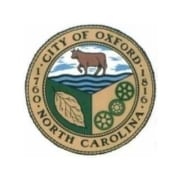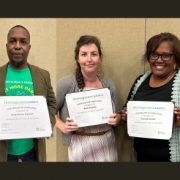Oxford Official Completes REDI Training From N.C. Rural Center
Alyssa Blair, Downtown Development director for the City of Oxford, is among the most recent class to complete the Rural Economic Development Institute.
REDI, the N.C. Rural Center’s flagship leadership development program, is a three-month training program that offers participants resources and tools they need to tackle economic and community development issues facing rural North Carolina, according to a press statement from Bill Holmes, senior director of communications for the Rural Center.
In a press statement, Sabrina Richards, communications specialist for the City of Oxford, said “Alyssa’s participation in REDI reflects her ongoing commitment to professional growth and her passion for promoting economic development. We have no doubt that the knowledge and skills she has gained through this program will be invaluable in her role as Downtown Development Director and will continue to benefit the City of Oxford.”
Now in its 32nd year, REDI has trained more than 1,100 leaders across the state. As a graduate of REDI, Blair now joins that extensive alumni network that spans all of North Carolina’s 100 counties and includes graduates from the Rural Center’s other leadership training program, Homegrown Leaders. Many of the center’s leadership alumni are active in state and local government and in philanthropic, nonprofit and small-business sectors, as well as in faith- and community-based organizations.
“We had an amazing REDI class this year made up of a diverse group of participants from various sectors representing 18 different North Carolina counties,” said Olaunda Green, director of leadership training for the N.C. Rural Center. “Something magical happens when you put individuals into a room, who seemingly have nothing in common, but after going through this program, relationships form, connections are made and lifelong partnerships are created.”
Rural Center President and CEO Patrick Woodie delivered the final remarks of the graduation ceremony and encouraged the new graduates to return home to build bridges.
“Congratulations to this year’s class of REDI graduates for investing in yourselves and your communities through this valuable training,” Woodie said. “Rural North Carolina needs leaders like you willing to look at challenges in a new way, and we know you have many successes ahead of you.”
To learn more, visit https://www.ncruralcenter.org/.



